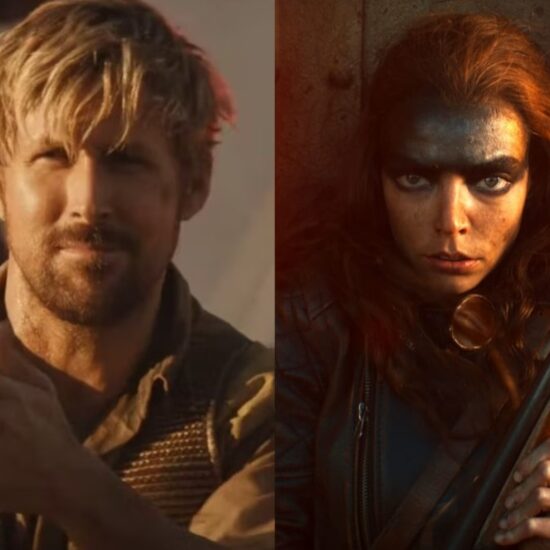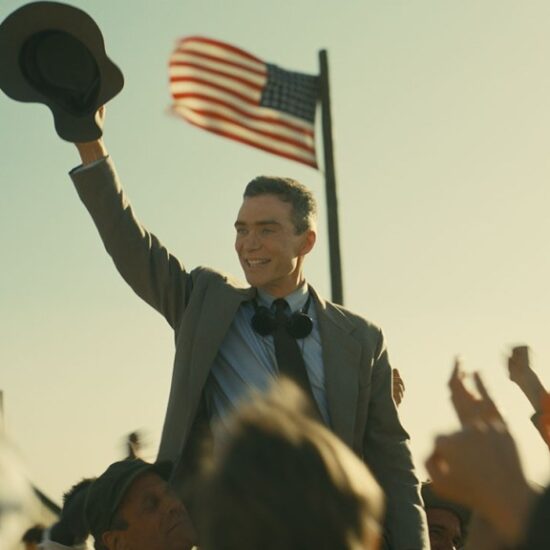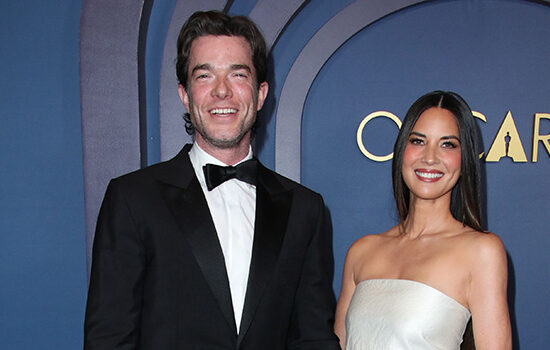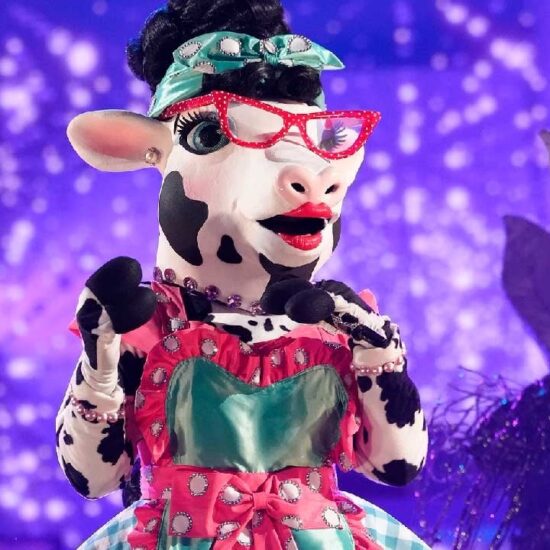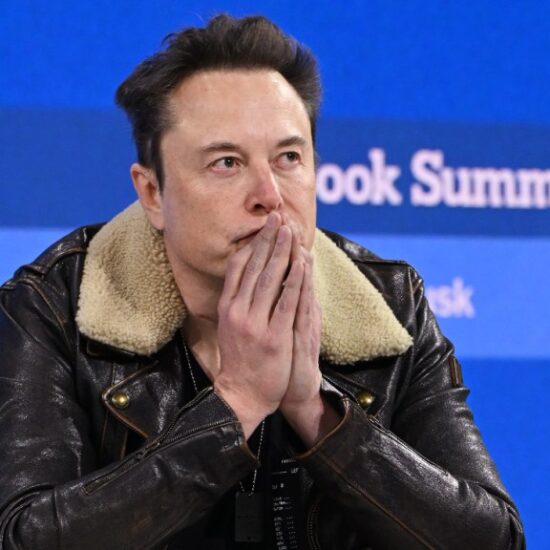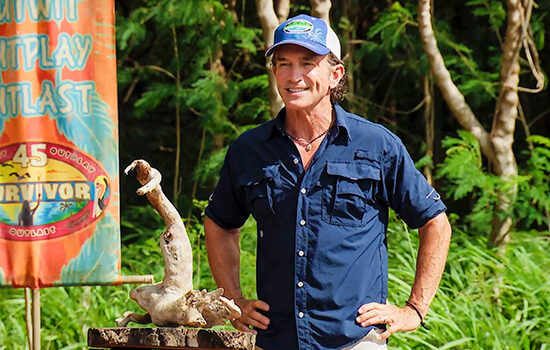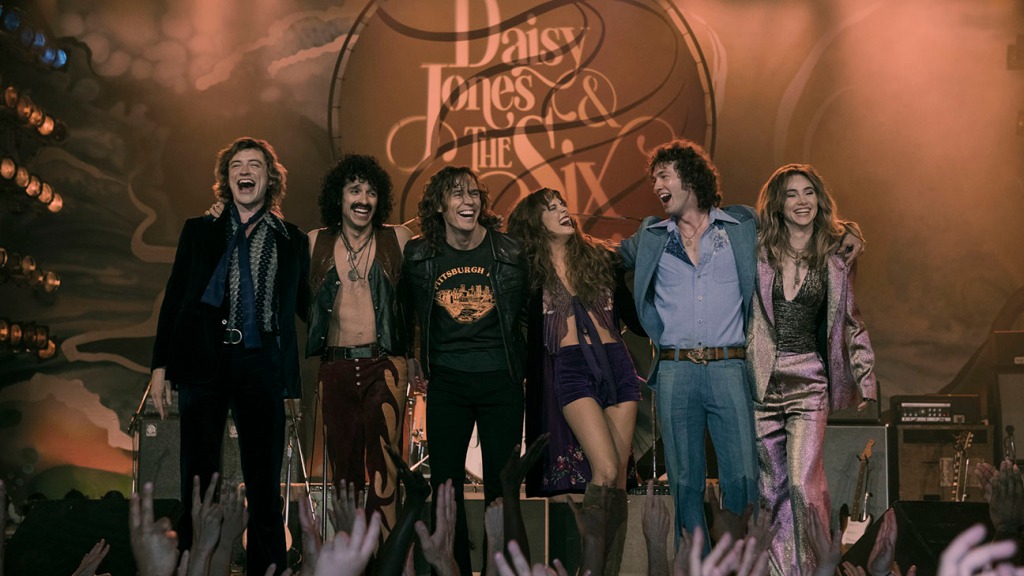
[This story contains spoilers for the full season of Daisy Jones & The Six.]
Life is already messy without sex, drugs and rock ‘n’ roll making things more complicated.
Just ask the showrunners of Daisy Jones & The Six Scott Neustadter and Will Graham, who address that and more in their Amazon series adaptation of Taylor Jenkins Reid’s bestselling novel of the same name.
Throughout the 10-episode Prime Video series, viewers watch the renowned fictional band Daisy Jones & The Six find their way to success and instant fame in the 1970s. But following their rise into a musical empire, it all ultimately crumbles and implodes amid a series of internal dramas. Led by Billy Dunne (Sam Claflin) and Daisy Jones (Riley Keough), the self-proclaimed tight-knit family is confronted with varied hurdles, including substance abuse, unrequited and (dangerously) requited feelings, alongside the jealousy and egos that come with navigating the treacherous waters of fame and success.
In the final episode, unbeknownst to them, the fictional rock band has what would be their last show to a sold-out crowd at Soldier Field in Chicago. In this moment, their secrets breach the surface as Billy, Daisy, Camila and the rest of the Six ensemble realize that even the smallest of choices they’ve made have altered their lives and the fate of the band forever.
“What we were trying to craft in those final moments is every person — Daisy, Billy and Camila — all [having] really big choices to make. And those choices are getting made out of a better understanding of themselves, but also out of finally really understanding and loving the other people involved,” showrunner Graham tells The Hollywood Reporter.
“One of my favorite things about the novel is that it’s messy. These relationships, it would be great if they were really simple and it was easy,” Neustadter says. “I think the sort of push and pull the whole time is, can you navigate those treacherous waters without hurting feelings, without causing a big mess in your family? I just loved exploring that sort of territory.”
In separate interviews about the March 24 series finale, Neustadter and Graham sat down with THR to discuss bringing the bestselling novel to life amid high fan expectations, the series’ love triangle, a surprise romance and that cliffhanger ending.
Daisy Jones is a book that was not only successful at the time it released but continues to grow a massive following of fans. What was your approach to adapting a book of this scale?
SCOTT NEUSTADTER I got the book sent to me when it was still an unpublished manuscript. I was probably one of the first 10 people to ever look at it, only because Taylor [Jenkins Reid]’s manager, Brad, knew that I was a big music nerd and wanted to share it — thought I would get a kick out of it. Reading it, I was really just OG fan number one, anticipating that everybody was eventually going to love it. There wasn’t a lot of competition because it hadn’t been published and no one knew anything about it. Similarly, when we did the adaptation of Fault in Our Stars, it was a book that hadn’t been published yet and there hadn’t yet been the fervor that would then grow and be very intimidating. I definitely prefer that because it’s hard to adapt something knowing that everyone is going to be scrutinizing every page and every change. Being the original fan that I was, really the goal here was to replicate the feeling I had reading the book for all of the people who hadn’t read the book or all the people who had read the book when they watched the show. I hope that fans of the book, when they come to the series, recognize that the changes we made, some of them were economical, some of them were creative, but all of them are within the spirit of Taylor’s book.
WILL GRAHAM Everybody who works on the show is obsessed with the book. That’s why we’re all here. What Taylor Jenkins Reid does in her writing and the passion and huge emotions and the world that she takes you into, we’re just trying to do that same thing for fans in a different medium. But I think what’s particularly interesting about adapting this book and what gave us so many fun opportunities is the novel is in the form of an oral history, so what you’re getting in the novel — and Taylor’s very conscious about this in her writing — is the story people want to tell 30 years later. We know from being humans that memory changes things and the way that people tell their stories changes. There’s also lots of moments in the book where you don’t quite know what happened. Our challenge in the adaptation was to answer some of those questions and unfold them. Ultimately, the book isn’t going anywhere, and as Taylor said, this just gives fans more to enjoy.
How did you select the music team to work with and shape the songs and sounds?
NEUSTADTER It was really the most crucial thing to think about. If we write this perfectly but we don’t have the music, I don’t think we’re going to be convincing that this is the biggest band in the world and these are artists. We talked to a handful of music producers and songwriters and then we were invited to Sound City, where Blake Mills and his partner Tony Berg set up camp and Mick Fleetwood first heard Lindsey Buckingham play the guitar. We sat down with Blake and Tony, and talked to them about what we were going to need. They were so excited about it and so enthusiastic. They’re both really musical geniuses. Tony was around in the ’70s. Blake was not, but has a real affinity for the sound. [We talked] about writing in a character’s head, having to write all this original music, but it’s going have to have a narrative function. [For example], we need a song that Billy writes when he’s really mad at Daisy and it’s like a diss track, and then he makes her sing it. Those guys were like, “That sounds really fun and also I’m going to round up my buddies Phoebe Bridgers and Jackson Brown and Marcus Mumford, and maybe they’ll want to write some songs.”
GRAHAM We were so lucky to get to work with Blake Mills and Tony Berg. In our first conversation with them, they said, “We don’t think this should sound like any other band. We think it should sound like an album from the time that somehow got lost. That fell behind the couch but you’re just finding now. It has its own heartbeat and it has its own sound and doesn’t sound like anything else.” Blake, Tony, Z Berg — who wrote a bunch of the additional songs — and the amazing group of songwriters they put together really approached it that way. I think what often happens in TV is you write songs into the scripts. In this case, we approached the making of the album as just as important as the show. Both of them kind of adapted to each other during the process and I think that’s part of why ultimately the album stands on its own and fans are engaging with it.
There is a scene early on in the show where we see Daisy performing and her guitar strap is a replica of one Elvis Presley wore. Can you talk about how that Easter egg happened?
NEUSTADTER It’s an amazing Easter egg and it was a surprise to me as well! I checked in with Frankie Pine, our music supervisor, and I said, “This is going around the internet, is it true? ‘Cause it’s awesome!” She checked in with our guitar tech who’s our guitar aficionado on set, his name is Danny, and he did it on purpose and nobody talked about it. I don’t think it was ever flagged for anyone. It was just something that he thought would be really cool. I can’t believe someone found it on the internet. That’s the level of dedication that people are watching the show is so cool.
GRAHAM You know what, I have to be completely honest with you. I did not know. (Laughs) But I was delighted!
One of the relationships explored in the story is Daisy, Billy and Camila’s. Can you talk about how you wanted to chronicle the growth and downfall of Daisy and Billy’s relationship in the series?
NEUSTADTER One of my favorite things about the novel is that it’s messy. It would be great if [these relationships] were really simple and it was easy. Billy’s married and he’s devoted to his wife. Camila loves him and accepts his failings. It’s much more complicated than that and real life is much more complicated than that. The relationship that Billy has with Daisy is a completely different one than the one he has with Camila. I don’t think Camila is jealous of that, but I do think there’s an element of understanding that she can’t give him that thing that Daisy does give him. The push and pull the whole time is, can you navigate those treacherous waters without hurting feelings, without causing a big mess in your family? I just loved exploring that sort of territory. Also, talking about the collaboration part of it, how when feelings get involved, that could also mess that up and can you have a partner who you have feelings for that you don’t wan’t to have? Even though they push you to do your best work, they might also push you to be your worst self.
Riley Keough (Daisy) and Sam Claflin (Billy) in Daisy Jones & The Six.
Lacey Terrell/Prime Video
GRAHAM What is interesting to me about all of those characters is that they are all really in love with each other in a way and want the best for each other. I think it’s episode seven, there’s something that Nicky says to Daisy about [how] life sometimes gives you someone who’s either a soulmate or a mirror and you can’t quite tell which one they are. That was something that we thought a lot about in shaping their dynamic. From the moment that Billy and Daisy meet each other, there is an instant connection that tells them, this person is someone significant in my life. They might be a friend, they might be a collaborator, they might be a lover and truthfully, maybe they don’t fit into any of those buckets. But there’s something pulling them together. The show asks the question, is it really possible to love more than one person? What does that mean and what’s complicated about that? I think and hope that like the book, it finds complicated and satisfying answers to those questions. But we never wanted Camila to feel less important. In some ways, she’s the soul of the entire show and the driving force of a lot of the big decisions that happened in the show.
We see Daisy and Billy struggle with their own obstacles, specifically with their journeys around substance abuse. How did you think about portraying the experience of addiction? What did you want to focus on and how did you want to do that differently through those two?
NEUSTADTER In the book, there’s that great scene where Billy is sitting at the bar and he is very tempted to drink and doesn’t. In fact, in the book, he never relapses. We talked to a lot of addiction counselors and experts on the subject and they said, “Sure, that’s possible but it is not the majority of addicts.” When all of this tension is happening, and Billy is on a downward spiral, the idea that he’d find himself in a bar — having lost his family, having lost everything and not slip — just felt like it would not have been authentic to the characters in the world that we were building. So we have him do the thing and then after that, there’s a messiness in that he apologizes and he says, “I’m sorry, I’ll never do it again.” But [Camila] doesn’t forgive him. She makes him work for it, and she makes him prove that that’s true and prove that he’s worthy of it. Ultimately, he can come around and say, “She was the love of my life.” She saved his life, she sticks with it. It’s a similar place we end that the book does. We just get there on a few more treacherous beats.
GRAHAM Both Billy and Daisy are people with big holes inside of them because of their families and the way they grew up. As many do in the world, you try to find people who fit into some of those spaces and when that doesn’t work, you also try to find substances or other things that fit into some of those spaces. We really wanted to handle those stories with a lot of care and authenticity. But what’s interesting about this show, especially for Billy, is that that’s such a familiar narrative in the world of rock ‘n’ roll. For him, it really is the beginning of his story and the beginning of what makes him complicated as a character. Getting a chance to tell a story, not just of someone’s crash, but of someone who’s really living in recovery and having a full and passionate life and balancing that with the things that they care about and the music they’re making, I thought that was a pretty extraordinary story to be able to tell.

Riley Keough and Sam Claflin
Lacey Terrell/Prime Video
Daisy and Billy’s breaking point takes place during The Six’s final show. Can you talk about their ending in that moment and whether you felt their relationship was true love or misconstrued as such?
NEUSTADTER Daisy comes to realize that she loves him but the version of him that will be available to her is the worst version of him. She’ll never have the version of him that Camila has. That realization triggers an understanding of what their dynamic is, but also she wants to be a better version of herself. Billy embracing her and saying, “Let’s be broken together” is giving up. It’s saying I lost everything so I’m bringing you down with me. There’s nothing less romantic (Laughs) than that in the world. We structured it differently from the novel, where basically Camila comes in and says, “You need to go now,” and Daisy says, “Yeah, OK. You’re right, I do.” This is much more each one of them gets to choose their own destiny in a way and they make hard choices.
GRAHAM There’s a word in Japanese that means someone you were in love with in another lifetime and that is the feeling that hangs over their relationship to me. Clearly, they’re meant for something together, but what we were trying to craft in those final moments of that episode is every person — Daisy, Billy and Camila — all have really big choices to make. Those choices are getting made out of a better understanding of themselves, but also out of finally understanding and loving the other people involved. Daisy, in that moment, sees who Billy is going to become if he decides to be with her and who she’s going to become if she’s with that version of Billy. I don’t think she’s rejecting him. She’s saying neither of us wants to be those people.
Can you talk about Camila’s decision to stand by Billy, despite the ways he hurt her? How did you want to portray their relationship differently than Billy and Daisy?
NEUSTADTER I felt this about the book as well, but Camila is the hero of the story. She is the heart and the soul of the entire journey. And ultimately the reveal is that this whole thing is basically a daughter [Billy and Camila’s] trying to figure out her parents’ marriage and how her mom could have made the choices that she made. Why would she bring Daisy into the band? It’s really her encouragement that causes Billy to accept all of the turmoil that comes out of that. In our version of the show, she is a part of this band. Their success is her success. She says, “I didn’t move here for you. I moved here for us.” This is her life, too, and she’s not going to let him spoil her life. She does what she has to do the whole time to keep that in mind. The one breaking point for her is if he fell in love with someone else because she’s put him first and all she really wants in return is that he puts her first. If he doesn’t, that’s when there’s no turning back. I was interested in that marriage. I think that there’s something really amazing about her strength. I don’t think anybody’s watching this saying, “No, Camila, don’t do it.” I do think there’s an element of that’s going to be really hard and I hope they find a way out of this.
GRAHAM Camila and Billy are soulmates and they’re on a journey together, and deeply in love with each other from the start. We wanted the audience to feel that Billy is never not in love with Camila, and Camila, in a sense, is never not in love with Daisy. She always believes in Daisy’s talent and her as a person and those things are unquestioned. The question is how they exist alongside of everything else that’s happening in the story. We also thought a lot about how Camila tells her story in the book and who she’s talking to. Obviously, she’s trying to be honest, but we thought — and some of this was in consultation with Taylor — the reality might have been a little messier. That’s what led to some of the choices around the old friend that she goes to see and some of the other moments of the book because nobody always has the answer.

Camila Morrone (Camila) and Sam Claflin (Billy) in Daisy Jones & The Six.
Lacey Terrell/Prime Video
Camila is shown to keep her own secret: she has a romantic moment with band member Eddie. What did you want to explore there?
NEUSTADTER There’s this wonderful scene in the novel where Billy is talking about how Camila went to lunch with an old friend and they were gone for several hours. And then Billy says, “Yeah, I know that you don’t go to a six or eight-hour lunch.” It starts to open the door to the realization that maybe not everybody’s telling this interviewer all the things. The secrets that emerge were really interesting and you can get away with alluding to them in the book in a way that we would have to show and be a little more upfront about. We turn the dial up on Eddie’s feelings for her throughout the series, basically starting from the beginning. At this moment, where she’s starting to question if anyone’s putting her first, there’s Eddie and Eddie will put her before everyone else in the world. It’s a revelation for her that no one has done that and she deserves it. That moment just made sense to us. When it was first pitched in the writer’s room, I was like, “Aye yai yai. I don’t know.” Then the more we talked about it, the more we realized that it is there.
GRAHAM What we were trying to explore is exactly what Camila says in the show, which is: how do you, in a world where you’re surrounded by secrets and where there’s a lot of things happening outside your control, get some semblance of power back? She needed a secret of her own. What we’re trying to do there is just let the character speak authentically and let her have her own journey and have some parts of her life that are messy. And ultimately, have the places that she’s able to get in understanding herself and Billy feel completely earned.

Josh Whitehouse as Eddie Roundtree
Lacey Terrell/Prime Video
Camila and Daisy may be involved in a love triangle but they never pit themselves against each other. Can you talk about exploring their relationship dynamic where there’s still love and respect despite the ups and downs?
NEUSTADTER I think that’s exactly right. When you love someone, you are supposed to want the best thing for them. I don’t think that Daisy was the best thing for Billy for a very long time because she was unlocking some of his worst instincts, but then she changed and he changed. Times have changed. Obviously, Camila got sick and it was no longer going to be about the two of them. So what’s the best thing for the person she loves? Maybe it’s this, but also maybe it’s not. I think they had to go down that road to see for themselves, but they never would have if she didn’t bless it. It’s just everybody making a choice at the end that will hopefully end up being the best choice for themselves.
In interviews Camila films, why was she referred to as Camila Alvarez rather than Camila Dunne?
NEUSTADTER In the beginning, there’s a moment where she’s deciding whether or not to go with them [The Six] and that’s when we introduce her. If we were to say, Camila Dunne, you know where we’re going. We could have changed it after the first episode once we know that they get married and everyone’s together. But, she has her own identity. I don’t really view her entirely as Billy’s wife in this story. So to me, it was about giving her own sort of presence and point of view and making her own character.

Camila Morrone
Lacey Terrell/Prime Video
With Simone, you expand on her story of a queer Black woman who faces painful hurdles as a result of their intersectional identities. What did you want to touch on through her expanded story?
NEUSTADTER It was really important to us that Simone had her own journey and that she wasn’t just there to help Daisy along with hers. We talked a lot about women at the time and how difficult it would’ve been for someone like Simone, who was queer and Black, to have any authority with the people she was working with. We talked to a lot of people who were backup singers at the time, some of whom would make their own solo album but they almost always were at the mercy of a male producer who was putting them in a certain box. If it didn’t work, the male producer went off and did a million other things, but the artists suffered and wished that they had an opportunity to raise their voice a little bit louder. Then, of course, you have the disco world which is so colorful and so cool and so rarely depicted. Especially that New York underground scene, in the mid-70s before disco really exploded. We wanted to do that and then talk about how even in a society where being true to yourself — and being out was far more acceptable in that disco world than it would’ve been in the rock world or any other places — you would have to sacrifice your true identity if you wanted major label success. We heard a lot of stories about people who had to silence that kind of thing.
GRAHAM You don’t go as far into her perspective in the book because of the nature of the oral history structure but we wanted to be able to do that. When we asked Taylor, “What would you want to see more of in the book that you didn’t get to see in the show?” she said more of Simone. I’m queer and I’ve always been fascinated by the stories around the roots of disco. Most of the time when we think of disco now, you think of Saturday Night Fever in terms of onscreen representation. But of course, that music came out of marginalized spaces — predominantly Black queer clubs. And for people who exist in those spaces, saying “let’s dance” isn’t substance-less. It’s a revolution. We’re going to dance despite the way the world is framing us and what the world is giving us. We wanted to embody that in the character and also acknowledge the extraordinary women, singers and DJs who helped create that sound that ultimately is still a huge part of our culture and our world today. Simone is so much more than just her identity. She is strong and vulnerable, and like Nabiyah Be [who plays Simone], she is a one-of-a-kind musical talent. It was so fun getting to craft that story with her and Ayesha Harris, who plays Bernie, who’s incredibly talented. It was a real joy for all of us to get to tell that queer story in the middle of this show.

Nabiyah Be (Simone) in Daisy Jones & The Six.
Lacey Terrell/Prime Video
You’re portraying decisions around abortion care through Karen at a time that was quite new, and a time that’s very different than now. Did you want Karen’s story to be through the lens of the ’70s women’s experience or a more modern one?
NEUSTADTER I feel like Karen is Karen and this felt so true to Karen’s character and who she was. A few years earlier, it wouldn’t have been as easy to do, but that happened to be a moment in time when it was OK and there were avenues to do what she needed to do. But Karen herself, I think she’s struggling with this moment because I think she does love Graham. I think she knows this is about to break his heart and there might be no coming back from it. But she has to do what’s right for her and what’s right for her is playing music. Ultimately, Graham is the one who lies and says, “I don’t need all these things. I just need you. I’ll be happy.” She knows it’s not true. It just felt like that was how these characters would find themselves in this situation, and this is how they would behave. It’s amazing that now we’re talking again about limiting those rights and making it harder for people to make the right choices for themselves.
GRAHAM That’s something we talked a lot about with our writer’s room. I think unfortunately in a lot of ways, maybe there’s not as much space between the ’70s women’s experience and the modern experience as we wish that there was. Women’s rights and their bodies have always been under threat in our country and we wanted to tell a story about that, that felt authentic to Karen and authentic to the book and give us a version of her decision that we didn’t feel like we’d seen before.

Will Harrison (Graham) and Suki Waterhouse (Karen) in Daisy Jones & The Six.
Lacey Terrell/Prime Video
This series features women in a band who are all different, yet standing on their own merits in a man’s world. Can you talk about depicting them navigating a world that is not built for them and surviving in their own ways?
NEUSTADTER One of the things that I loved so much about the book was the Karen-Daisy dynamic. Having one woman in a ’70s rock ‘n’ roll band would’ve been very strange. Having two is completely unheard of. I mean, Fleetwood Mac is one of the few examples. Then you have Heart and a few other interesting situations. More often than not, you would expect there to be some jealousy or threat, but Taylor doesn’t do that and I absolutely flipped for that. I loved that they would support each other and they would recognize how rare this is and how unique it was. Also that they’re different women and they have different abilities and passions and strengths. The fact that they could work together to make the band stronger was a great, beautiful element that I definitely want to highlight.
GRAHAM It’s something else we talked about so much with our writer’s room, but I think in that sense it really comes from the book and the feminist lens that Taylor brings to her writing — the female gaze that she brings to rock ‘n’ roll, which is obviously a world that we usually see through the male gaze. I’m non-binary and I think for me, part of what I love about these female characters is they embody a lot of parts of what we think of women in the ’70s, and then a lot of traits that you don’t necessarily think of. They all feel completely authentic and whole. They all have really strong desires. I think that’s such a credit to Taylor’s writing.
The fallout of the band is chronicled amid their final performance. What were the challenges of creating a live concert atmosphere amid COVID-19 safety protocols?
NEUSTADTER We took over this football field in New Orleans to film that final concert and they had to build this stage from scratch, which was an unbelievably challenging endeavor. On the day we were going to film there, we see the set and we can’t believe what we are looking at. Then all of a sudden you hear this chatter and whenever you felt this energy, you knew someone has COVID. It was Sam Claflin. They were like, “Maybe we can film around him.” I was like, “No, pretty sure you’re not going to be able to film around Billy Dunne at the concert because he’s going to be in the front and it’s all Billy and Daisy right now.” So, we ended up having to break down the set and come back a week later, which luckily, we were able to do. But it was a very intense, unbelievably bad-timing moment for our set. The following week, when we were able to go back there, everybody had been anticipating it and they were so excited to do it that you really feel the enthusiasm and the energy of them being on stage and finally being able to shoot these scenes that they’ve been waiting for. This was really one of the very first ideas that I ever had. I wanted to do the last episode as a concert film like Stop Making Sense, one of my all-time favorite movies. Being able to intercut with the drama, but then show the band at its peak, was important. Everyone was so excited to just shoot those concert scenes. It should feel like you bought tickets to an awesome show of a band that you love and have a backstage pass. That was always the goal.
The last moment of the series is left open-ended with a Billy and Daisy reunion but it’s unclear where their relationship goes. Why did you decide that?
NEUSTADTER My favorite movie ever is The Graduate and everything I do, I think, ends with that Graduate moment where hopefully we’ve answered all of your questions satisfactorily, but we’ve also started to ask new ones that you can debate on the way to the car. I hate happy endings. I’m really allergic to happy endings but I really love hopeful endings. To me, there was a lot of hope at the end of the book. Taylor and I both have talked about this a lot and we would never want to tell you guys what we think happens. But I love the fact that you can debate it and you can have different ideas about what happens next. There’s this thing at the beginning of this series where it’s basically [said] it’s not enough to meet the right person, you got to meet them at the right time. The question now is have they changed as people enough that the timing could be better or are there still too many demons?
GRAHAM Taylor’s book ends on a question and we did the same thing. I think you want the feeling of possibility. Maybe it has another chapter of these people, and maybe we’re at the end of the story, but it’s also a beginning that she did so beautifully in the book and we just wanted to do the same thing.
The Aurora album has been a success. Would a tour or live performance with the cast performing these songs ever be a possibility?
NEUSTADTER I mean, I sure hope so. I would buy a ticket. We made them do a show for us before we started filming and we know they can do it. They picked the set list, they picked the order, they didn’t have any accompaniment, they had to play all the instruments themselves and do all the singing. So we know that they could pull it off and we know it’s a spectacular show.
GRAHAM We would love it and I think the cast would love it, so we’ll just have to see what we can make happen!
Interview edited for length and clarity.
Daisy Jones & The Six is available to stream on Prime Video.









